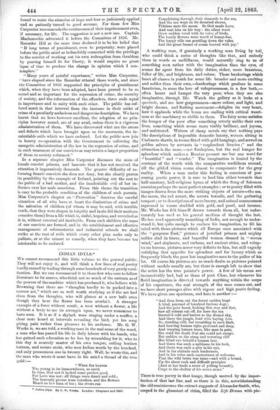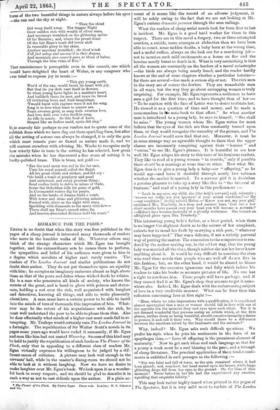INDIAN IDYLS.*
WE cannot recommend this little volume to the general public. They will not enjoy it, and will think a few lines of real poetry hardlyearned by wading through some hundreds of very gaudy versi- fication. But we can recommend it to those few who care to follow literature to its source, who think not so much of the outturn as of the powers of the machine which has produced it, who believe with Browning that there are "thoughts hardly to be packed into a narrow act," which are as well worth studying as if the act had risen from the thoughts, who will glance at a new bulb even though they hear the flower has been overlairi. A stranger example of a force without result, a root without a flower, a life without a body to use its strength upon, we never remember to have seen. It is as if a skylark were singing under a muffler, a clear note heard at intervals revealing the bird, yet his song giving pain rather than pleasure to his audience. Mr. G. W. Weeks is, we are told, a working man in the real sense of the word, a man who has passed his life in daily labour with his hands, who has gained such education as he has by scrambling for it, who to this day is scarcely master of his own tongue, calling horizon horizon, and secure sC.ciir, who uses Indian words by the hundred, and only pronounces one in twenty right. Well, he wrote this, and the man who wrote it must have in his mind a thread of the true gold :—
"When the heaven Was young in its immortalness, as earth In time, God saw it lacked some perfect good, For Love was not : all things were dumb and cold ; The heavenly groves were voiceless, and the flowers Heard no low hum of bee; the rivers ran
* Indian Idea. By G. W. Weeks. London: Chapman and Hall.
Complaining through their channels to the sea, And the sea wept on its deserted shores, Tideless unto the moon. So God made Love, And sent him on his way : the silent wood Grew sudden vocal with its voice of birds, The lonely flowers were woo'd of honey-bee, The happy rills ran prattling down the vales, And the great breast of ocean heaved with joy."
A working man, if genuinely a working man living by toil, who could think a series of thoughts like that, and embody them in words so mellifluous, would naturally sing to us of something seen rather with the imagination than the eyes, of scenes far apart from his daily duties, richer, more luxurious, fuller of life, and brightness, and colour. Thom hankerings which beset all classes in youth for some life broader and more exciting and nobler than their own,—hankerings which produce in some fanaticism, in some the love of voluptuousness, in a few both,— often haunt and hamper the very poor, when they are also imaginative, through life. Watch the gallery as it looks at a spectacle, and see how gorgeousness—mere colour, and light, and bright dresses, and flashing movement—delights its very heart, how it applauds while the boxes are smiling with critical weari- ness at the machinery so visible to them. The fairy scene satisfies the hunger of the poor after something utterly unlike their own lives, something which seems more visibly brilliant, and joyous, and unfettered. Writers of cheap novels say that nothing pays like descriptions of impossible domestic luxury, women sitting in Cashmere shawls, in rooms fitted with gold hangings, and served on golden salvers by servants in "resplendent liveries ;" and the attraction is the same,—not flunkeyisn, but the real hunger for splendour which makes a Russian peasant use but one word for " beautiful " and scarlet." The imagination is heated by the contrast of the words with the comparative sordidness around, till the gilded vision seems almost to compensate for the grey reality. When a man under this feeling is conscious of pos- sessing poetic power, it is sure to lead him either towards that half-amatory, half-religious hymn of which the Song of Solomon contains perhaps the most perfect examples ; or to poetry filled with images drawn from the more striking objects of nature—the sea, the moon, the red sunset, the aurora borealis, and the gathering tempest ; or to descriptions of mere luxury, and animal sensuousness expressed in verses studded with gold, and pearl, and incense. Mr. Weeks has felt himself drawn towards them all, but unfor- tunately has used as his general medium of thought the last. He has read apparently something of India, not enough to under- stand it, but quite enough to enslave his imagination, to fill his mind with those pictures which all Europe once associated with the "gorgeous East," pictures of jewelled princes and mighty nobles clad in tissue, and beautiful women dressed in "woven wind," and elephants, and turbans, and ancient cities, and volup- tuous harems, pictures never very definite to him, but still vaguely satisfying that appetite for splendour and for luxury which so frequently blinds the poor but imaginative man to the pallor of his lot. Of course his pictures are as much daubs as pictures painted without models usually are, but there is enough left to show that the artist has the true painter's power. A few of his verses are inconceivably bad, bad as those of poet Close, but whenever his florid imagination is directed towards anything within the scope of his experience, the real strength of the man comes out, and we have short passages alive with vigour and high poetic feeling. We have given one specimen, and here is another :—
"And then from out the forest sudden leapt A hind, pursued of hundred furious dogs ; And the poor beast, looking this way and that, Saw all retreat out off, for here the sea Stretch'd cold and barren to the dismal sky, And there the jungle, loud with baying foes.
So, standing still, but trembling in each limb, And heaving human sighs profound and deep, And weeping human tears, like man in pain, She staid the death that she could not escape. But sudden on the steep and towering cliff Her lifted eye beheld a human face.
And there was such a mildness in his look, And there was such a pity in his eye, And in his attitude such tenderness, And in his voice such earnestness of welcome, That the wild brute was tame—and with a bound, Up the sheer rock and difficult precipice (And at her heels a score of yelling hounds),
Crept to the shelter of his secure arms."
There is true poetry in that image, though marred by the imper- fection of that last line, and so there is in this, notwithstanding the old reminiscence the extract suggests of Alexander Smith, who, cooped in the gloomiest of cities, filled the Life Drama with pie-
tures of the two beautiful things in nature always before his eyes —the sun and the sky at night.
"Then the cloud Did weep itself away. The beggar Night Grew sadden rich with wealth of silver stars, And moonrays trembled on the glittering spires Of far Bonfires; and, where the proud dome Of the fair Rime's tomb did tower aloft
In venerable glory to the skies, Another moonray trembled ; the tired winds
Fell fast asleep and munnur'd in their dreams, And mountain airs cours'd pure as blood of babes, Through the blue veins of Eve."
That reminiscence is perceptible even in this conceit, one which would have delighted the heart of Weber, or any composer who ever tried to express joy in music :—
" This gay young earth, Woo'd of the sun, would break its heart with joy, But that its joy doth vent itself in flowers. So when young Love lights in a maiden's heart, And bnildeth there its nest., and rears its brood Of twittering loves and fond imaginings,
Twould burst with rapture were it not for song. Song is to love what tears to sorrow are. Tears sweeten grief, as song doth sweeten love, And love doth ever voice itself in song, As rills in music. So this Soul of Love, Shaped like an Indian maid, again did sing."
It,is scarcely fair perhaps to our readers not to quote some of the rubbish from which we have dug out these sparkling lines, but after all the setting of a stone can always be changed, it is only the gem which must remain pure or flawed as nature made it, and we will content ourselves with advising Mr. Weeks to recognize early how utterly false in taste is the setting he has selected, how great the mistake when he has discovered a fine stone of setting it in badly-polished brass. This is brass, not gold :—
" Ere the next morn was red in the far east,
Unto his royal council called the Rajah All his great chiefs and sirdars, and did say :
Go build a tomb of porphyry and pearl
And satinwood, and every precious thing ; Send coolies forth to delve in mines of Onde,
Scour the Golcoldan hills for gems of gold,
In Coromandel waters dig for pearls, And on the banks of Jumna build a tomb, With tower and dome and glittering minaret, Fretted with silver as the night with stars,
Sparkling with diamonds as the morn with dew—
There shall my Rane's sacred ashes lie, And heaven-desconcled Brahma hold his court."































 Previous page
Previous page